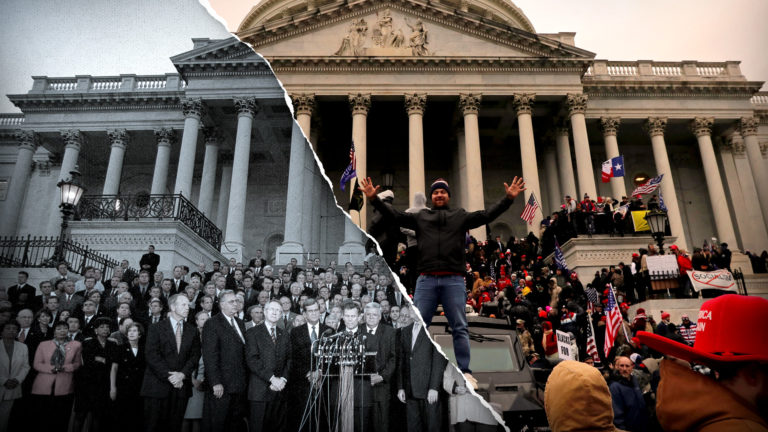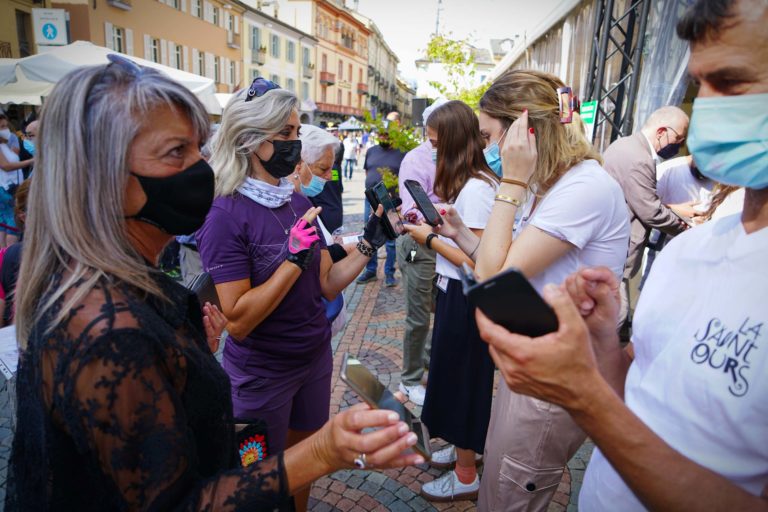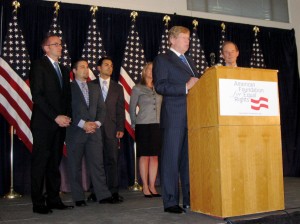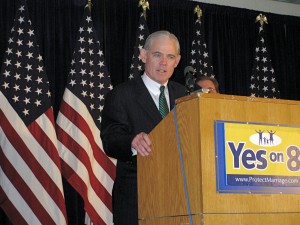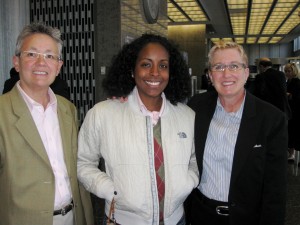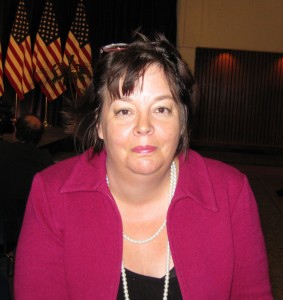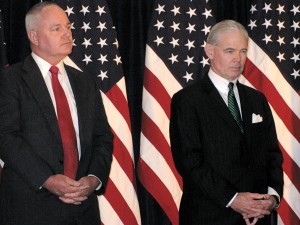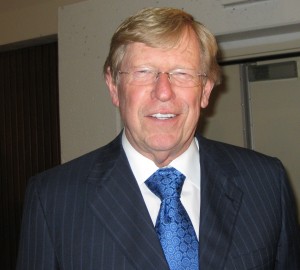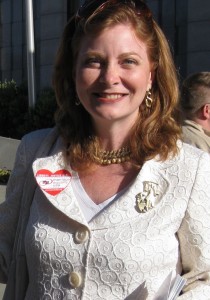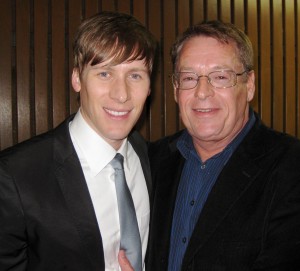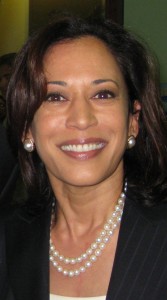(UPDATED to delete inaccuracy): For some long-term West Hollywood residents, there has never been as nasty a campaign season as the one leading up to the Tuesday, March 8 election for three seats on the West Hollywood City Council. Unsubstantiated allegations of corruption and campaign finance irregularities – standard fare for most political contests – have devolved into a very real breach between women and gay men in a community internationally renown for welcoming diversity.
Unlike the city of Los Angeles, where the seven councilmembers elected from 26 candidates will have to cut jobs and public services to close a $404-million budget gap (the mayor and city council have already dealt with a $1-billion shortfall over the last two years), the 1.9 square mile city of West Hollywood has a $68.5 million General Fund reserve, has not had to cut jobs or social services and is, in fact, building a library and expanding and renovating Plummer Park with money raised, saved and designated for those projects.
But while the city of West Hollywood has its fiscal house in order, it is in serious danger of losing its mythology – the belief that WeHo is an urban village where all – especially society’s odd creative outsiders – are welcome.
What follows is not an endorsement or intended to otherwise suggest for whom the reader should vote. In fact, I strongly urge you to check out this post that features all nine candidates on video speaking directly into the camera about why they are running. Rather, this piece is an attempt to offer another perspective to the barrage of slanted blog coverage, which has often been misleading, incorrect – or in a few cases, downright scandalous.
The West Hollywood Democratic Club endorsement, part one
The anticipated fireworks did not materialize at the second West Hollywood Democratic Club endorsement meeting
Endorsed incumbents Mayor John Heilman, Councilmember Lndsey Horvath, Councilmember Abbe Land (Photo by Karen Ocamb)
at the National Council of Jewish Women LA headquarters Monday, Feb. 21. It was a far cry from the earlier meeting when the club’s recommended candidates in the March 8 election for WeHo City Council – incumbents Mayor John Heilman and Councilmembers Abbe Land and Lindsey Horvath – received a majority of votes but not the required 60 percent of credentialed club voters, thanks to a surge in new members supporting the challengers. This time the club voted 48-10 to endorse Heilman, Land and Horvath.
Two of the biggest issues discussed during this WeHo election campaign have been strict parking enforcement (requested by the neighbors in those heavily-trafficked business and nightclub areas) and over-development, an issue mostly involving vacant buildings that the city planning commission and the city council might not have foreseen at a time when the truth of the near-Great Depression economy was hidden even from incoming President Obama. And, as was revealed during one of the candidate forums, sometimes people believe in false assumptions such as: Is development of new affordable housing a priority over preserving existing rent controlled housing? “That’s a false dichotomy,” said incumbent Mayor John Heilman. “You need both.”
The President’s Day meeting started with tension in the air. Everyone seemed braced for a confrontation, the new-normal whenever the challengers – six gay men with varying degrees of political experience: John D’Amico, Scott Schmidt, Steve Martin, Mito Aviles, Lucas John and Mark Gonzaga – encounter the incumbents seeking re-election.
Tension, anger and distortions of the facts are standard in almost every political election – commonly explained away as “just politics.” In small elections that do not draw the attention of FactCheck.org, candidates usually feel free to say whatever they want without close scrutiny – there is little chance they will wind up in court, under oath, having to back up their assertions with evidence under a withering and precise cross examination by David Boies, as he questioned the ProtectMarriage witnesses in the federal Prop 8 trial.
Some distortions are minor and easy to fact check. For instance, candidate John D’Amico’s supporter Vince Roncone wrote a Facebook post Monday, Feb. 21, about the “urgent special meeting” called by the West Hollywood Democratic Club. In fact, it was a regularly scheduled general meeting with club endorsements, club president Josh Kurpies told me, not “urgent” or “special” nor was it called for or coordinated by Heilman, Land and Horvath, as Roncone contends.
But it’s the sexism in Roncone’s inaccurate Facebook alert that seems echoed by most of the challengers:
“Lindsey Horvath was appointed to the council and is new to the community. She belongs to the College Republican Club where she was an advocate for George W. Bush and the Iraq war. Abbe Land whispers, Horvath is being harassed because she is a woman but, ignores her attachment to Lindsey’s appointment and campaign. 39 qualified community servants were overlooked – which included other democratic woman.”
Gay Republican candidate Scott Schmidt
First of all, given the above complaint, no New Yorker should have ever voted for Hillary Clinton for US Senate. She did not live in New York when she decided to run for Senate, she once was a Goldwater Republican and in October 2002, as a Democrat, she voted for the war in Iraq. In Clinton’s case, no one seemed to hold her right to change her mind and party affiliation against her. In Horvath’s case, however, some of the WeHo challengers make her youthful membership in the Republican Party – a result of family influence – an albatross from which she can never be freed, despite her publicly expressed regrets. The blatant sexism here is that while some of these challengers are going after Horvath, challenger Scott Schmidt is the proud and effective president of the LA chapter of the Log Cabin Republicans and none of his fellow challengers have raised the “R” word against him.
The contentious appointment process
Roncone’s ire is focused on Horvath’s appointment over “39 qualified community servants.” Yet the appointment process to fill a seat vacancy has a long history – the most recent California example is Gov. Schwarzenegger appointing Abel Maldonado to replace Lt. Gov. John Garamendi, who was elected to Congress in a special election. After Horvath’s appointment, WeHo City Clerk Tom West posted an unscientific survey on the City Clerks Association www.californiacityclerks.org/ listserv asking how many cities had held special elections to fill a vacancy or used the appointment process or waited until the next election. West said he received 48 responses, 44 in which clerks said their city filled vacancies through appointments.
It’s my understanding that the City Council’s decision to appoint someone to fill out the term of the late Councilmember Sal Guarriello instead of holding a special election was because a full council was urgently needed to make some important upcoming decisions. Additionally, the city wanted to save the money it would take to hold a special election: writing, printing and mailing a ballot, notifications, publicizing the election, sponsoring and televising debates, setting up a special page on the City Clerk’s website, setting up polling places, getting and training volunteer poll workers, taking city staff away from other duties to handle the election, etc.
The appointment process was open, transparent and decided before the public in an open city council meeting viewed on television and online. Of the 39 people who filed applications for the job (all applications are public record), 36 came to the meeting and had an opportunity to make a presentation. Additionally, people for certain candidates and people against the process spoke during public comment.
The City Council took one long night to make the appointment, narrowing the list from 39 down to 12 and then the
Lindsey Horvath and Abbe Land (center) at Laurel Park opening (Photo by Karen Ocamb)
top five. There is a persistent rumor among supporters of the challengers that the councilmembers agreed beforehand to give each other a “secret veto” of one candidate that the others could not contest. That is given as a reason for the elimination of such highly respected candidates as Kate Bartolo and John Altschul. However – such an arrangement would be a clear and serious violation of the California Brown Act, (visit Californians Aware for an explanation of the Brown Act), which prohibits elected officials from discussing and making decisions together out of view of the public. Since Heilman is a law professor, Mayor Pro Tem John Duran is an attorney, and Councilmember Jeffrey Prang is the Assistant City Manager for the city of Pico Rivera – as well as the required ethics training for all elected and appointed public officials – such illegal collusion is difficult to imagine without evidence. So far, there has been no complaint filed with the West Hollywood City Clerk or City Attorney or the LA District Attorney’s Public Integrity Division or the Secretary of State.
Land vehemently denied that such an action occurred:
“We did not. That did not happen. We did not have a secret veto. Our process was done at council meetings and during those meetings, people were voted on or people said who they supported. And so some of those people might not have been supported. But there was no pre-ordained secret veto – that would have been a violation of the Brown Act. We had a process. We made our thoughts known during that process in open council meetings. We had candidates come and speak to us. We conducted the proceedings according to the laws.”
Horvath was the only candidate who made the Top Five list of all four councilmembers. Prior to the selection process, all the applicants agreed they would support whoever was appointed. When the list got down to three applicants – two gay men, Joseph Guardarrama and Agassi Topchian, and Horvath – the council decided to compromise. Horvath had votes from Heilman and Land and Prang finally offered to change his vote. With those three votes, the councilmembers asked Duran if he would be willing to support Horvath. Duran agreed and the vote on the Horvath appointment was unanimous.
Some wonder if the appointment process would become so controversial if a gay man had been appointed instead of a young straight woman.
WeHo Democratic Club endorsement, part two
Nonetheless, Horvath’s appointment has become a lightening rod for the challengers. And yet after all the sturm und
Lindsey Horvath and Jeanne Dobrin, foreground, who refused to leave the podium (Photo by Karen Ocamb)
drang raised at the first West Hollywood Democratic Club meeting, only two people opposed the club’s final endorsement of the incumbents. One of them, 90 year old Jeanne Dobrin, actually announced support for Land and Heilman (to a lesser degree) while slamming their “slate” – and Horvath, who Dobrin said knew nothing about zoning and land use issues. (Ironically, Horvath said she took UCLA Extension classes on land use and zoning with Sue Buckner after the former applicant was named to the Planning Commission. Horvath appointed Guardaramma, who calls her “a smart person, a good person. She really puts he community’s best interest first when she votes.”)
Ed Buck, a former WeHo council candidate, was the other endorsement opponent. “This three-way endorsement is an abomination,” he said, noting that when he ran in 2007 “the deck was stacked” against him. “I saw the ugly underbelly” of politics. I got very mad.” He told me later that the club’s endorsement was a “done deal.”
Indeed, Mito Aviles was the only one of the six challengers who attended the meeting, but his appearance seemed more perfunctory than focused. He talked vaguely about how people in West Hollywood want to have a voice and be included in the process of the city” without giving any specifics.
Challenger Steve Martin, who was once on the West Hollywood Ciyt Council and once president of Stonewall Democratic Club, later said that it was a “waste of time going” and disparaged the club’s endorsement. “They don’t do any work. How many volunteers do they generate? How many volunteers does Stonewall generate? It’s not worth the emotional effort.”
Heilman, Land and Horvath showed up, talked about their love for the city and appealed precisely to the Democratic nature of the club. “I support and believe in Democratic values. This is not just an endorsement,” Horvath said. “I regret nothing more than supporting another party in the past.” Now as a progressive, she is running for re-election to “demonstrate exactly what ‘progressive’ means in West Hollywood.”
In fact, after Arizona passed the abhorrent anti-immigrant “documents please” SB1070, Horvath introduced a resolution to ban official travel to Arizona and review contracts with Arizona-based businesses. Some of her challengers have questioned why West Hollywood should care about discrimination in Arizona.
At the meeting, Heilman, who is known to many of the members – nonetheless made a respectful pitch for their votes of endorsement. He noted some of his long list of accomplishments, including launching the Sunset Strip Business Association, the Convention and Marketing Bureau, and the Avenue of Arts and Design, as well as his commitment to affordable housing and his “passion” for social services. Land contested the argument that the city is no longer following the progressive values upon which it was founded. “We have not strayed…This is a community that cares,” she said, adding that she’s proud of the work she’s done. She noted that West Hollywood now has a Triple A Bond rating.
Jeff Prang, who once seemed to be the favored councilmember of some of the neighborhood groups trying to oust
Councilmember Jeffrey Prang and Commissioner Ruth Williams
Heilman and Lang, defended his council colleagues and the club’s procedures. In a phone interview, he said that local political activists and elected officials are involved on a regular basis with club activities such as phone banking for club-supported issues and candidates. The endorsement process itself is not a simple beauty contest but rather entails an interview process and candidates are required “to meet certain standards.” That means, Prang said, “that the club members know the incumbents, they’re well-liked and the challengers have an uphill battle. And most of these challengers are not active in Democratic Party politics.”
West Hollywood Public Safety Commissioner Ruth Williams made a similar point, noting that Horvath is considered something of a heroine to women for her work as Hollywood chapter president of NOW. Working with community leaders and LA County Sheriff Lee Baca, she found the money to fund testing for the huge backlog of DNA evidence in unsolved and unprosecuted rape cases. Women view rape as a matter of public safety, not merely a political and apparently easily dismissed “women’s” issue. In fact, it was Williams who first suggested four years ago that Horvath, an entertainment ad executive, run for political office.
Endorsement by the Democratic Party and Democratic clubs are no small matter since with endorsement comes mailers and robo-calls. LA County Democratic Party Chair Eric Bauman, who is also Vice-Chair of the California Democratic Party and former president of the Stonewall Democratic Club, is making energetic phone calls urging WeHo to vote for Heilman, Land and Horvath.
Michael Andraychak and Eric Bauman voting (Photo by Karen Ocamb)
“The LA County Democratic Party will disseminate our endorsements aggressively and widely to voters in West Hollywood, via mail, phone and email. We take our involvement in races like West Hollywood most seriously,” said Bauman told me.
Bauman and his husband Michael Andraychak (the couple is celebrating 28 years on March 27 and were legally married in October 2008) spoke at the WeHo Democratic Club meeting. Andraychak was perplexed that some voters were so anxious to unseat “good solid leadership” in a city that is “operating in the black” and is “in good [financial] shape today. Do you have any idea what’s going on” in this economy? Andraychak asked.
Bauman came to the podium waving a copy of the LA Weekly cover story featuring Mito Aviles and “marionettes” Heilman and Land. “This is not journalism – this is trash,” Bauman said angrily, regarding a story with which many found fault. He, too, cited the city’s “stellar bond rating,” adding that he lives in the “near bankrupt city of Los Angeles.”
Former WeHo city council candidate Ruth Williams also spoke for the incumbents. Williams said she has lived in West Hollywood since 1949 and was part of the cityhood movement. Heilman, Land and Horvath, “have proven and committed themselves to the values of the Democratic Party and the West Hollywood Democratic Club,” she said. “They have a proven record with the Democratic Party” and they didn’t just bring in members to get an endorsement. She was clearly upset over what she called the “unfair” and “sexist” tone of campaign, which she hopes is an “aberration.”
In a later interview, Williams, who is Director of Advocacy at NCJW/LA, was furious over a story that appeared in the WeHoNews blog that she had called the LAPD to come to the meeting, ostensibly because the blog’s controversial publisher Ryan Gierach was there to cover the club’s meeting. Williams said that earlier she discussed with Capt. Davis how the Jewish Center has to constantly be on guard against possible hate crimes and the officers just stopped by that night to check in.
Charges of corruption and other campaign complaints
There have been numerous complaints about “corruption” at City Hall, including campaign finance irregularities that the DA’s office is “actively” investigation. This is from the Perez Hilton-wanna-be blog WeHo Confidential:
“ Lindsey Horvath is now being investigated for illegal campaign practices for using city logos, letter head & email contacts to fund her 2011 re-election campaign. She will receive a misdemeanor once found guilty.”
DA spokesperson Jane Robison says, however, that one complaint against Horvath received last November was an
open-and-shut case because the complaint “lacked merit;” the DA’s office has no such active investigation. The
Campaign poser for Mito Aviles
complaint pertained to Horvath’s use of the city logo on her campaign website, which was immediately taken down when City Clerk Tom West sent out a letter informing all candidates such use was a violation. Candidate Mito Aviles also used the city logo until then as well, but there was no formal complaint filed with the DA’s office nor has there been any publicity or charges of corruption leveled against Aviles.
Another more complicated charge of corruption was initially raised last year by candidate Steve Martin in his column on the WeHo News blog. Martin suggested that Abbe Land may have violated state public disclosure laws because the website for the non-profit Saban Free Clinic, where she is a co-director, showed contributions from people who also come before the city to do business. He suggested that Land solicited those donations for the charity she runs – but failed to disclose the solicitation and the amounts received in the state conflict-of-interest forms. In a phone interview, Land said she has always complied with all laws and filed conflict-of-interest forms – WeHo City Clerk Tom West said are available for public viewing at the office but not yet online.
Land said:
“I don’t believe I have violated conflict of interest laws. Some of those donations like Live Nation – were other people in the organization – mainly volunteers – solicit. They’re friends of board members, they’re board members of the organization and I have not solicited people. And I do not believe that I have violated the conflict of interest laws.”
I named a few donors – Live Nation (which owns the House of Blue site), Page and Lou Adler (who owns Rainbow Bar and Grill on Sunset), Susan and Alan Casden (owner of Movietown Plaza). Land said:
“Those people are people that board members and volunteers at the clinic solicit for funds – many of them have been giving for years – Lou Adler was involved with the clinic when it started in 1967. They give on a regular basis and I am not usually soliciting their dollars. I don’t solicit the dollars of people that are doing business in front of the city for the clinic. Many of those names are people who are on our board, who are longtime supporters of the clinic or who have been solicited by other people who are involved with the clinic and based on their relationship.”
I asked if she filled out Form 700, the conflict of interest form:
“Yes, I do. That’s the form I fill out every year and I have to say where I own property, where you work and I declare where I work at the clinic, and any other income that you get. And I also have to declare if my husband has any interest that is over $10,000 – that he might have received revenue from people doing business here. So I disclose all of that, if it’s applicable.”
Mayor John Heilman (Photo by Karen Ocamb)
Another complaint wafting through the challengers’ campaigns about the pressure lobbyists feel to contribute to the incumbents’ charities, whether it’s having to go to a dinner for the Saban Free Clinic or receiving an email from John Heilman announcing that he’s running in APLA’s annual AIDS Marathon and asking for financial support. On the campaign trial, Heilman says he’s proud of the $200,000 he’s raised for AIDS at APLA. But apparently at least one lobbyist, who would not give his name, said he felt his job required a financial response to that fundraising solicitation letter – as well as to contribute to Doctors Without Borders, another favorite Heilman charity – so Heilman would see his name on the list of donors and therefore feel favorably inclined towards the lobbyist and/or his project.
I’ve received those APLA fundraising letters from Heilman, too, but have never felt pressure to contribute in order to maintain access to him as a journalist. I didn’t ask him if he culled the names of lobbyists from his presumably large charity-related email list.
There’s also a complaint about lack of transparency at City Hall regarding how the city went from a $100 million reserve to $68 million – as if there is something nefarious about the “disappearance” of that money. But City Manager Paul Arevalo, City Clerk Tom West and Anil Gandhy, Director of Finance and Technology, point to the Financial Reports posted on the city’s website featuring the Budget and specifically the 2009-2010 Comprehensive Annual Financial Report (CAFR) to show exactly how the city spent its money and balanced its budget – without layoffs or cuts or reduction in services. Arevalo notes that in the last five years, there has been a “draw down” on the General Fund only last year and this year – $10 million for two cash-funded projects: $6-7 million for the Sunset Renovation project and $3 million for the purchase of property. There has also been some fiscal transfer for the parks and library capital projects, as well.
“There has been no drastic hemorrhaging of General Funds,” Arevalo said, adding that the Bond rating had recently been recalculated with the city receiving a Triple A Bond rating, while the city of Los Angeles was downgraded.
Women feel under attack
CBS late night host David Letterman and the LA Times noticed the blatant sexism in how CBS and Warner Bros. looked the other way when actor Charlie Sheen’s bad behavior included deadly threats to his ex-wife – but suspended Sheen’s hit show Two and a Half Men after Sheen disparaged the show’s male creator.
From the LA Time’s Mary McNamara:
“So now we know.
If you are the star of a hit comedy on CBS, you can keep your job in spite of accusations of: threatening your pregnant second wife; holding a knife to your third wife’s throat on Christmas Day; and indulging in cocaine-fueled weekends during which your bizarre behavior causes your female companion to fear for her life.
But say mean things about Chuck Lorre and You Are Toast.”
It’s troubling that Letterman and the LA Times can ascertain when blatant sexism is right in front of them – but that somehow eludes the gay male candidates who claim to want to represent the entire city of West Hollywood, including its women.
Since the uproar over the Tom of Finland exhibit – which longtime feminist and artist Ivy Bottini first brought to the attention of Mayor Pro Tem John Duran – gay men in WeHo have been issuing a call to “Take Back Boystown” from straights with strollers. Though West Hollywood Chamber of Commerce board president Alan Bernstein is a proud gay dad who has strolled his children in the Christopher Street West Pride parade – many women have perceived the call to “Take Back Boystown” as a slight against their very presence.
It is part of a larger national Zeitgeist women have been feeling for a while: the assassination attempt against Arizona Rep. Gabrielle Giffords; the brutal sexual assault against CBS News correspondent Lara Logan by 200 men in Afghanistan and the subsequent Internet attacks suggesting she deserved it because she’s pretty; the religious and political right wing attacks against abortion rights and the Congressional defunding of Planned Parenthood – prompting California Rep. Jackie Speier to stand up on the House floor and talk about terminating her own pregnancy.
When WeHo News blogger Ryan Gierach posted video of him aggressively chasing Lindsey Horvath at the opening of Laurel Park – some WeHo women started feeling as if the national assault was coming home. There was – and continues to be – as sense of insecurity and anger – especially among lesbians who have always stood by gay men, even when gay men were too afraid to stand by each other during the AIDS crisis. Why don’t these theoretically sensitive gay men – the ones who recently rose up over feeling their culture was threatened – why don’t they understand the threatening situation women find themselves in today?
But instead – in the name of “anything goes” election politics – the attacks have not only come home but have intensified.
Lucas John, one of the gay male candidates, tells the WeHo News he has “better things to do with my time than to police comments & edit articles to appease third parties or extremists” after the Lucas John -supportive WeHo Confidential called Land a “shady puta,” (whore) and let stand a comment referring to Horvath as “Whore-bath.”
Meanwhile, the WestHollywood Patch (the AOL micro-site) let stand a comment suggesting Land be hanged:
“Bob
8:48am on Wednesday, February 23, 2011
It was a public Hanging. We need to publicly hang those who think it is a good idea that our Sheriff policing Force drives down from the Antelope Valley everyday on the 14 freeway instead of having our own WHPD.
West Hollywood bleeds public safety dollars to people who do not even live here and who vote for Sarah Palin first. West Hollywood does more to support Pro 8 Republicans than any other city in the county.
They should put up Abbe Land then next time a public hanging takes place. However they should use a proper hangman’s knot.”
It was too much for Ivy Bottini, who railed against the harassment at a West Hollywood City Council meeting.
Bottini told me the next day:
“I’ve been fielding phones call day from women in the community saying it’s about time somebody spoke up about how the women are being treated and attacked in this election. For 35 years, I’ve fought for gay men. Now I call upon gay men to stand with me and put women back on the council.”
Candidate John D’Amico and Mayor Pro Tem John Duran (Photo by Karen Ocamb)
I had the same experience after I appeared on Warren Olney’s “Which Way, LA?” radio show on KCRW (“A Rumble in West Hollywood). I’ve been on the show before and the producer and Olney know me as a journalist. But they felt the need to have someone representing the six gay challengers and brought on candidate John D’Amico. I called D’Amico and gay Republican Scott Schmidt “viable candidates” (and erroneously said there were no people of color running – Mito Avilies is a candidate of color). But after I suggested that the gay men were angry over the potential loss of gay culture (though the gay bars are still packed) and the women were angry over the sexism, D’Amico, in a very patronizing manner, said I was “exaggerating” the anger. I responded by noting that the anger was also evident in publications that backed D’Amico – such as the LA Weekly and the WeHo News blog – as well as the two candidate forums.
The following day I received a call from Madeleine Rackley, a straight WeHo at-large Arts Commissioner, who heard the radio broadcast and was angry on my behalf. She told me:
“I am concerned that in this election, some of the candidates are not listening to women and not taking women seriously. It seems to me in some ways to be dividing the city. There is a meltdown happening in the LGBT communities and between men and women. And that kind of patronizing threatening language and behavior is dividing us.”
She feels the Tom of Finland controversy “triggered something. The real issue is the perception that they are being marginalized. But it could have been anything.”
Now she asks:
“Why is there a gang of six gay men who are not listening to women? Why are we descending into uncivil speech about each other? But there are opportunities to make it better. These are serious issues that need to be addressed – and now we can talk about them because they out in public.
The dream of living in a progressive city does not belong to one group,” telling me of a mother who moved to West Hollywood “on purpose to raise her family here because it’s a progressive city.”
Land says:
“I do think there has been sexism in this campaign and that there has been a targeting with some of the statements and some of the allegations specifically directed to the two women running. I think people should be angry at that because all of us should be fair and talking about facts and not making the kinds of comments that are being made that are sexist, offensive and belittling.”
Ruth Williams says:
“The tone is as if we are dividing the community! I was so angry [at the West Hollywood Democratic
Ruth Williams
Club meeting] because I come and work and phone bank for the city – and who the hell are these other people who show up with the attitude that they can fix all these things. All the fights we’ve won and lost – all the standards we’ve set when it comes to human rights. And they say, ‘Take Back Boystown’ as if we’re trying to destroy the gay community in West Hollywood! I’m just so upset. And when Ryan chased Lindsey around the park like that – to me, the relentless attacks are against women, more than against Lindsey. I just keep shaking my head.”
(Section deleted)
Finally, a number of people have called me complaining that they were interviewed by Patrick Range McDonald for his cover story in the LA Weekly – but received nary a mention because – they suspected – they only had positive things to say. Of course, it is the prerogative of the reporter and editor to decide who to include, exclude or edit out – though some critics think McDonald started with a preconceived premise and cut to fit. His descriptions of the women candidates are also interesting. Land is described as “a lanky, middle-aged woman with short, spiky hair, looks stunned and uncomfortable when the Weekly approaches her.” And “[a]n outspoken and sometimes combative feminist.”
And then there’s this:
“Horvath, a pixielike 20-something woman with short, blond hair, is oddly programmed and almost robotic in talk and style, her unnatural delivery and bland words sometimes coming across as if she’s carefully rehearsed the Heilman-Land message in a bedroom mirror.”
But perhaps the most disturbing image of all is the cover shot – candidate Mito Aviles, who gained international fame for hanging Republican Sarah Palin in effigy, is pictured next to two mannequins with the heads of John Heilman and Abbe Land. Upon closer inspection, it appears that there are “strings” to the elbows of each Heilman and Land – but the other “strings” are around the necks of the two incumbents. After the Sarah Palin-effigy incident, Aviles and his partner Chad Michael Morrisette gave an interview in which the paper reported that in addition to then-Mayor Jeffrey Prang, the LA County Sheriff and the Secret Service all discussing the effigy with them:
“The NAACP also sent representatives, according to Morrisette, who supported his right to showcase the effigy, but suggested he showcase it in a different way, rather than from a noose.”
If these mannequins were black, would the West Hollywood progressive or LGBT communities have sloughed off the symbolism as they have apparently done with this cover?


